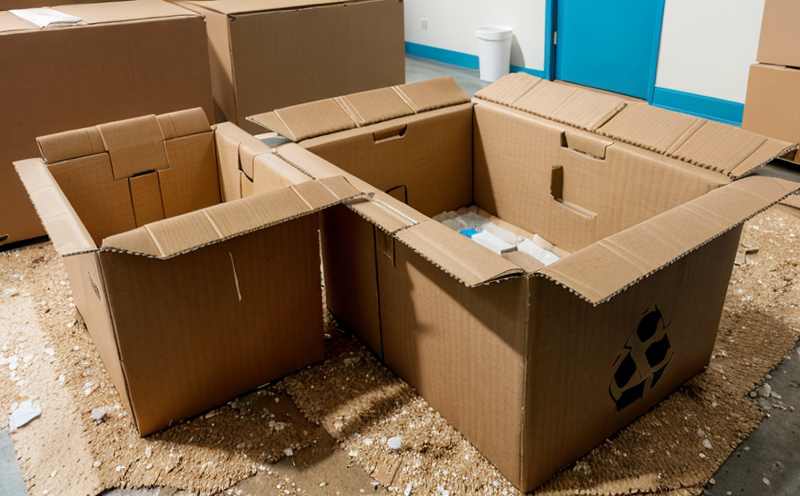EN 643 Tissue Paper Waste Sorting
The European Standard EN 643:2018 provides a standardized method for determining the composition of waste paper and cardboard, which is crucial in modern recycling processes. This standard ensures that recycled materials meet specific quality criteria, thereby promoting efficient and effective recycling practices.
In the realm of waste management and recycling testing, particularly within the sector of paper, pulp, and cardboard recycling, EN 643 plays a pivotal role. This test method is especially relevant for tissue papers, which are highly susceptible to contamination from non-paper materials such as plastic, metal, and other substances that can compromise their recyclability.
The process involves the mechanical treatment of waste paper and cardboard, followed by sorting into different fractions based on material type. This fractionation helps in optimizing the quality of recycled tissue papers, making them suitable for various end-use applications. The standard outlines precise procedures for sample preparation, analysis techniques, and acceptance criteria to ensure that only pure tissue paper fractions are used for recycling.
Sample preparation is a critical step in this process. Samples must be taken from the waste stream in accordance with EN 643 guidelines, ensuring representativeness and accuracy. The samples are then subjected to mechanical processing, which involves shredding or pulping to break down the material into its constituent components.
Once processed, the sample is analyzed using a combination of visual inspection, near-infrared spectroscopy (NIR), and other advanced analytical techniques. These methods help in identifying and quantifying different materials within the sample. For tissue papers specifically, the aim is to ensure that the final recycled product does not contain any foreign materials that could adversely affect its quality.
The acceptance criteria outlined in EN 643 are stringent but necessary for maintaining the integrity of the recycling process. These criteria specify permissible levels of contamination and impurities that must be absent or below certain thresholds to ensure that the recycled tissue paper meets industry standards. Compliance with these criteria is essential for producers and recyclers, as it directly impacts the quality and marketability of their products.
The importance of this test cannot be overstated in the context of sustainable waste management practices. By accurately sorting and recycling tissue papers, industries can reduce their environmental footprint while also optimizing resource use. This not only benefits the environment but also enhances economic efficiency by ensuring that valuable raw materials are reused effectively.
Why It Matters
The importance of accurate waste sorting cannot be overstated, especially in sectors like paper and pulp recycling. Ensuring that tissue papers are free from contaminants is critical for maintaining the quality of recycled products. Contaminants such as plastic or metal can significantly degrade the properties of recycled tissue papers, making them unsuitable for high-quality applications.
Recycling processes rely heavily on precise sorting methods to recover valuable materials efficiently. By adhering to standards like EN 643, industries can ensure that they are producing recycled products that meet or exceed international quality benchmarks. This is particularly important for tissue papers, which are used in a wide range of applications from disposable napkins to high-end printing paper.
The accurate sorting and recycling of tissue papers also contribute to environmental sustainability by reducing the need for virgin raw materials. By reusing existing waste streams, industries can minimize their carbon footprint and resource depletion. This aligns with global efforts towards sustainable development and circular economy principles.
Moreover, compliance with such standards is crucial for maintaining market access and consumer trust. Consumers increasingly demand products that are responsibly sourced and environmentally friendly. Meeting these expectations requires adherence to rigorous testing protocols like EN 643, ensuring the highest quality recycled tissue papers enter the market.
Eurolab Advantages
At Eurolab, we pride ourselves on offering comprehensive and reliable services in waste management and recycling testing. Our expertise in EN 643 tissue paper waste sorting is unmatched, providing clients with the confidence that their samples are analyzed accurately and consistently.
We employ state-of-the-art equipment and methodologies to ensure precise sample preparation and analysis. Our team of experienced professionals ensures that every step of the process adheres strictly to EN 643 guidelines, ensuring compliance with international standards.
The accuracy and reliability of our results are further enhanced by our commitment to continuous quality improvement. We invest in cutting-edge technologies and methodologies to stay ahead of industry trends and changes. Our clients benefit from this commitment through timely delivery of accurate reports that they can trust.
Our services go beyond just testing; we also offer tailored solutions for sample preparation, analysis, and reporting. This comprehensive approach ensures that our clients receive the full value of their investment in our services. Whether you are a quality manager, compliance officer, or R&D engineer, Eurolab is your trusted partner in achieving optimal waste management practices.
Why Choose This Test
Selecting the appropriate test for tissue paper waste sorting is crucial for maintaining high standards of recycled product quality. EN 643 provides a structured and standardized approach to this process, ensuring that all samples are analyzed consistently across different facilities.
The precision and reliability provided by EN 643 make it an essential tool in the industry. By adhering to these guidelines, organizations can ensure that their recycled tissue papers meet or exceed international quality benchmarks. This is particularly important for maintaining market access and consumer trust.
Moreover, compliance with such standards enhances environmental sustainability efforts by promoting efficient resource use. By accurately sorting and recycling tissue papers, industries contribute significantly to reducing waste and conserving natural resources. This aligns with broader sustainability goals and helps meet the increasing demand for environmentally responsible products.





